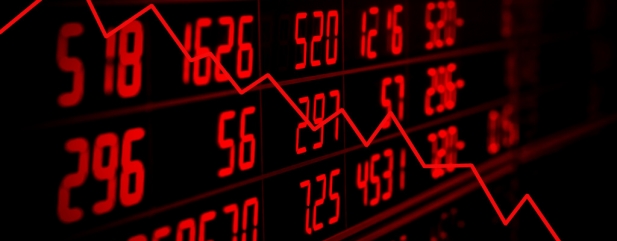Archived article
Please note that tax, investment, pension and ISA rules can change and the information and any views contained in this article may now be inaccurate.
Why stock markets around the world plunged last week

Last week was not a good one for stock market investors in pretty much every part of the world.
Big countries from the UK to India, Brazil to China, and the US to Japan, saw their main stock markets plunge amid concerned over the prospects for global growth.
Already fragile thanks to the threat of the US-China trade war going global, the world economy has taken a turn for the worse thanks to a large amount of bad data.
WHAT’S GOING ON?
A lot of important data was released last week which tells us how economies around the world are doing. Barely any of it was good.
Most of the bad stuff came from Purchasing Managers’ Index (PMI) surveys in countries across the globe.
Every month, purchasing managers, namely the people who buy in the raw materials, goods and services required by a company, are asked a series of questions about their business to gauge how positive or negative they’re feeling about the immediate future and about the longer-term outlook.
The questions include levels of manufacturing (how busy they are), levels of new orders (how busy their customers are), levels of inventory (how much stock they have) and levels of employment (whether they are hiring or firing people).
The questions are quite general and the replies are sorted into more positive than last month, less positive than last month, or no change on last month.
Each month the change in sentiment – whether it’s positive because more managers gave positive responses or negative because there were more negative responses – is added to the previous month’s index number to create a new number.
If every purchasing manager is positive month after month the index will only go up and if they are gloomy month after month it will keep going down.
The crucial level for the PMI is 50: a reading above 50 is taken to mean that manufacturing is expanding, a reading below 50 means it is contracting.
WHAT IS THE DATA SAYING?
In the past month, three of the five biggest economies (the UK, Japan and Germany) recorded a score below 50 for their manufacturing PMI, the fifth time in a row according to data provider IHSMarkit.
While the US appears to be in positive territory, figures from another PMI data provider (ISM) give a different picture on American manufacturing with a score of 47.8.
Manufacturing data is always closely watched despite the fact many developed countries are no longer driven by manufacturing.
This is because when manufacturers are confident they invest in their businesses. In turn this can lead to increased employment which leads to higher levels of consumer confidence and ultimately consumer spending, which accounts for the majority of most big economies.
WHY IS THE LATEST DATA IMPORTANT?
The data suggests economies around the world don’t look like growing at the rate investors would’ve hoped for.
Disappointing PMI data from the US has worried investors because the ISM score of 47.8 for September is well below the 50.1 the market had expected. This puts the threat of a recession in the world’s largest economy back on the table.
The figures also give major cause for concern over Germany given that its manufacturing PMI has collapsed, tumbling from the start of the year onwards to hit its lowest point in September since the financial crisis.
Germany’s economic fortunes are closely watched by investors as it is the largest country in the Eurozone and the fourth biggest economy in the world.
Investment bank Liberum says: ‘Without any financial crisis as in 2008, there has not been such a gulf between the performance, suggesting the structural pressures of auto, tariffs and outsized Chinese exposure may be taking their toll on Germany.’
WHAT’S HAPPENING TO STOCK MARKETS?
Stock markets plunged last week. The FTSE 100 recorded a huge drop, hurting the value of pension funds and investments. The main indices in Brazil, Germany, France, Japan, India, the US and Hong Kong also recorded sizeable losses over the week.
The big trigger was the disappointing PMI data from the US, while Germany’s data also went down like a lead balloon.
All the negative manufacturing PMI scores from the world’s biggest economies have got people in the market worried about the growth prospects for companies in these countries.
Therefore a significant chunk of investors have been selling their shares en masse, effectively trying to cash in now because they think things will probably get worse in the months ahead.
IS IT REALLY ALL THAT BAD?
The new week has so far been a somewhat different story, with stock markets cautiously regaining some ground on last week’s losses.
But investors are still nervous over US-China trade talks and continued uncertainty over Brexit negotiations.
While this may not be good for your FTSE 100 tracker fund or ETF, it’s not bad if you’re a gold investor or invest in gold mining companies. The shiny metal seems to have found its base level at $1,500 an ounce in response to all the economic gloom hanging around the world.
It’s worth highlighting that analysts at Liberum see things differently to the rest of the market.
They think the bad data from the US in particular signals a ‘correction’, so while things seem bad, the market before has been unsustainable and expectations are simply adjusting to the level where they should realistically be.
Important information:
These articles are provided by Shares magazine which is published by AJ Bell Media, a part of AJ Bell. Shares is not written by AJ Bell.
Shares is provided for your general information and use and is not a personal recommendation to invest. It is not intended to be relied upon by you in making or not making any investment decisions. The investments referred to in these articles will not be suitable for all investors. If in doubt please seek appropriate independent financial advice.
Investors acting on the information in these articles do so at their own risk and AJ Bell Media and its staff do not accept liability for losses suffered by investors as a result of their investment decisions.

 magazine
magazine










